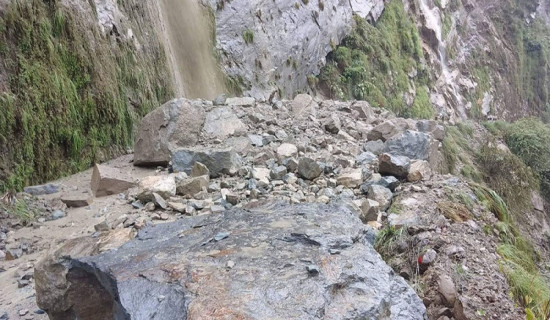- Thursday, 19 June 2025
Stillness Fuels Creativity
Not too long ago, I found myself sitting in a teashop in Basantapur, staring at my phone for no reason in particular. I wasn’t replying to a message or checking anything urgent – just mindlessly scrolling. Around me, others were doing the same. It struck me then that we don’t allow ourselves to be bored anymore.
As a 37-year-old living in the heart of Kathmandu, I’ve seen our city transform in remarkable ways. Faster Wi-Fi, digital wallets, food delivery apps, you name it. Life is more efficient now, but I wonder if in the rush to stay connected and productive, we’ve lost something subtle yet vital, the ability to sit with ourselves and simply do nothing.
Growing up in the 90s, boredom was a regular part of life. People stood in long queues at the water tap, sat through power cuts with candles and conversation, or watched clouds pass by during lazy clear afternoons. Back then, boredom wasn’t a problem to be solved. It was a space. An empty pocket of time that gently invited imagination, reflection, or simple rest.
Today, boredom is treated like a flaw. The moment there’s a gap in our attention, we reach for a screen. We binge, scroll, like, share, anything but sit quietly. But in constantly avoiding boredom, we’re also avoiding some of the richest parts of being human.
It turns out, boredom has its own purpose. Psychologists have found that moments of boredom actually stimulate creativity. When the brain isn’t busy processing new information, it starts to wander, to connect dots, to daydream. Some of my best ideas, even this very piece, have come while staring out of a microbus window or walking without earbuds.
Doing nothing also allows for emotional digestion. Life in Kathmandu isn’t exactly low-stress. We juggle traffic, deadlines, family responsibilities, and rising costs. Without a few moments of stillness, all that noise accumulates. We carry it in our bodies, our relationships, and our sleep. Sometimes, what we need is not more productivity hacks, but the permission to stop.
Of course, I’m not saying we all need to sit cross-legged and meditate for hours, though that wouldn’t hurt. But maybe we can reclaim small moments of idleness. Let’s wait in line without checking our phones. Let’s take a walk with no destination. Let’s sit on our rooftops in the evening and just observe the skyline, how the sun sets behind the hills, how the pigeons gather before dark.
In a society that increasingly equates worth with output, doing nothing can feel rebellious. But perhaps it’s the healthiest rebellion we can choose.
We should spend more time nurturing our inner artistic desires, whether it’s writing a poem, scribbling on a piece of paper, or simply whistling to a tune. Even in moments of boredom, we can allow ourselves to daydream, letting nostalgic emotions rise to the surface, giving us reason to smile. Rebellion, when framed in this light, becomes a positive act. By choosing to embrace stillness, we find productivity in the most unexpected of places.
So here’s a small challenge, from one overstimulated soul to another: the next time you feel bored, don’t distract yourself. Sit with it. You might be surprised at what rises from the stillness.
















